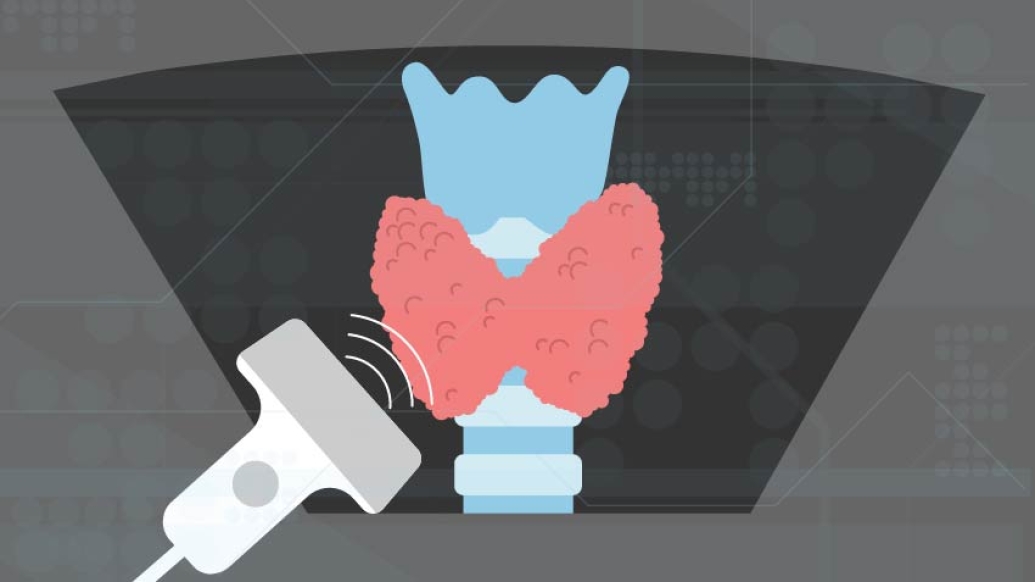While most thyroid ultrasound orders are warranted, researchers say guidelines could be clearer to help reduce over diagnosis of thyroid cancer.
11:00 AM
Author |

Up to one-third of physicians reported sending patients for a thyroid ultrasound for reasons not supported by clinical care guidelines, a new study led by University of Michigan Rogel Cancer Center researchers finds.
Routine use of ultrasounds to detect cancerous thyroid nodules have led to a significant increase in thyroid cancer cases in recent years, although many are low risk and unlikely to cause serious harm.
Researchers surveyed 610 surgeons, endocrinologists and primary care physicians who were involved in thyroid cancer care. Physicians were given different patient scenarios and asked when they would schedule a thyroid or neck ultrasound.
Like Podcasts? Add the Michigan Medicine News Break to your Alexa-enabled device or subscribe for updates on iTunes, Google Play and Stitcher.
An overwhelming majority of physicians said they used ultrasound for reasons that are supported by clinical care guidelines, such as a large nodule that can be felt or one seen on another imaging test. But 33% said they ordered an ultrasound because the patient wanted it and 28% said abnormal thyroid function tests drove their decision – a factor the Choosing Wisely Campaign specifically advises against.
Results are published in JAMA Surgery.
"This study is the first to look at why physicians are using thyroid ultrasound for patients. While often it's for clinically relevant reasons, a substantial number of physicians are not ordering them for reasons that are clinically supported," says senior study author Megan R. Haymart, M.D., Nancy Wigginton Endocrinology Research Professor of Thyroid Cancer and professor of internal medicine at Michigan Medicine.
SEE ALSO: For Low-Risk Thyroid Cancer Patients, Less May be More for Post-surgery Surveillance
When asked what most influenced their decisions for patients with thyroid nodules, 69% cited recent clinical guidelines. Haymart says this shows the situation is malleable.
"We can change behavior and help physicians use thyroid ultrasound more appropriately, which will reduce the incidence of low risk thyroid cancer," she says.
Organizations such as the National Comprehensive Cancer Network and the American Thyroid Association offer care guidelines based on data and outcomes from published studies. In addition, the Choosing Wisely campaign, which launched in 2012, identifies tests and procedures that should be discussed between patients and physicians to ensure appropriate and necessary treatment.
MORE FROM THE LAB: Subscribe to our weekly newsletter
"There is not specifically a guideline for when to order a thyroid ultrasound. The guidelines start once you find a nodule," says study first author Debbie W. Chen, M.D., an endocrinology fellow at Michigan Medicine. "Our study suggests there is an opportunity when working on the next set of guidelines to look a little upstream, before a clinical diagnosis, and offer better guidance for when thyroid ultrasound is necessary."
The key, researchers say, is to identify those thyroid cancers that will require treatment but to avoid over diagnosis by finding nodules that are slow growing and may never need treatment.
The finding that physicians were ordering thyroid ultrasounds because patients asked for them suggests a need for more education and discussion, Haymart says.
"There's so much emphasis in medicine on patient satisfaction. You do want patients to be satisfied, but physicians also have to do what's medically appropriate," she says. "Developing decision aids could help patients understand and decide when thyroid ultrasound is appropriate and when it's not."
Additional authors include David Reyes-Gastelum, Archana Radhakrishnan, Ann S. Hamilton and Kevin C. Ward
Funding: National Cancer Institute grant R01 CA201198, Agency for Healthcare Research and Quality grant R01 HS024512 and National Institutes of Diabetes and Digestive and Kidney Diseases grant T32DK07245
Paper cited: "Physician-reported misuse of thyroid ultrasound," JAMA Surgery. DOI: 10.1001/jamasurg.2020.2507

Explore a variety of healthcare news & stories by visiting the Health Lab home page for more articles.

Department of Communication at Michigan Medicine
Want top health & research news weekly? Sign up for Health Lab’s newsletters today!





